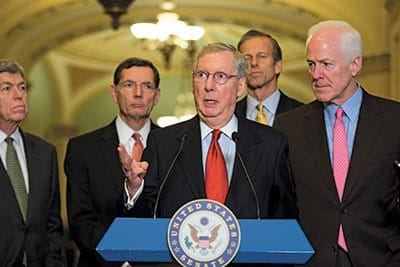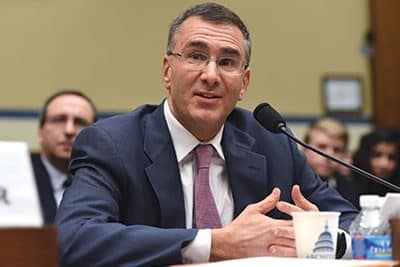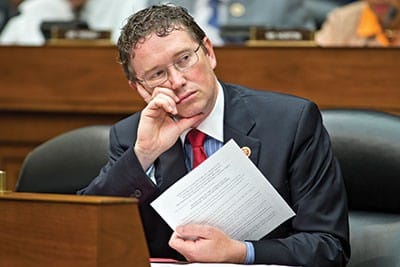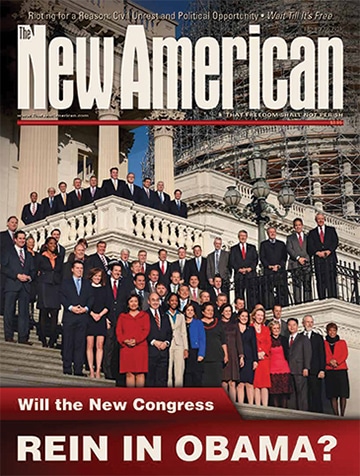Will the New Congress Rein in Obama?
President Obama boldly announced the creation of a massive new federal spending program by executive order — a decree that would create an expensive new federal aid program to local police agencies — on December 1 in remarks from the Eisenhower Executive Office Building:
I’m going to be proposing some new community policing initiatives that will significantly expand funding and training for local law enforcement, including up to 50,000 additional body-worn cameras for law enforcement agencies. And I look forward to working with Congress to make sure that in addition to what I can do administratively with the resources that we’ve already gotten, that we are in a conversation with law enforcement that wants to do the right thing to make sure that they’re adequately resourced for the training and the technology that can enhance trust between communities and police.

Police-cam panacea? President Obama has promoted the idea of issuing police cameras by executive order as a panacea for the militarization of police, but centralized power at the top is the problem and not the solution. (Photo credit: AP Images)
By “proposing,” Obama’s spokesmen later revealed, he essentially meant enact and spend. While more accountability for local police to their local elected officials is an objectively good end, the centralist means by which this program was created makes it highly objectionable. First, local police agencies are fully capable of funding the purchase of these devices; indeed, they would get the money for the purchase of cameras from the same place as the federal government: the American taxpayer. It’s not as if the federal government can pull wealth out of a void that is inaccessible to state and local governments and apply it to presidential wishlists.
And more important than the issue of federalism and decentralization is that Obama would fund the program exclusively by executive fiat. The Washington, D.C., newspaper The Hill noted that Obama’s new local police program would cost taxpayers some $263 million over three years ($75 million of which would purchase the cameras), all spent without so much as a “by your leave” from Congress. Sure, Obama talked about working with Congress in the speech excerpted above. But he also made abundantly clear the new program would spend the specified money whether Congress sent him additional funds or not. Obama essentially announced he had found $263 million under the seat cushions of the White House couch that he could spend at whim.
Obama’s police camera announcement brings up a critical question: If the president can create this new program to spend hundreds of millions of dollars out of thin air without any consent from Congress, then why couldn’t the president create other extra-constitutional programs out of thin air, costing hundreds of millions and perhaps hundreds of billions more? And if that’s the case, what need is there for Congress?
Of course, under the U.S. Constitution, Congress controls the purse strings by appropriating the funds and specifying the purpose. But will Congress exercise this power to rein in a rogue president? Or will the president tame Congress by threatening to veto appropriation bills not to his liking — and then blame Congress for the resultant government shutdown?
Republican congressional leadership rhetoric has changed only a little since the elections. “There’s not going to be a government shutdown,” incoming Senate Majority Leader Mitch McConnell (R-Ky.) was still saying during a December 3 meeting at the White House with President Obama, an almost identical statement to what he said after the elections. But McConnell also remarked in an interview with the Wall Street Journal December 2: “The president has been way out of line with his executive amnesty, [but] shutting down the government is not the way to respond.”
The Immigration Dare
McConnell’s remarks to the Wall Street Journal were directed specifically at Obama’s bold executive order putatively granting legal status to some 4.5 million illegal aliens, a direct contravention to Obama’s responsibility under Article II of the U.S. Constitution to “take care that the laws be faithfully executed.” Obama’s “deal” — announced in the wake of a post-election defeat of his party in a November 20 nationally televised address — would promise no deportations for illegal immigrants who have been longtime residents of the United States or who are family members of legal residents or citizens, provided the illegal immigrants pay about $500 in fines and do not have any criminal record (other than breaking border laws):
So we’re going to offer the following deal: If you’ve been in America for more than five years; if you have children who are American citizens or legal residents; if you register, pass a criminal background check, and you’re willing to pay your fair share of taxes — you’ll be able to apply to stay in this country temporarily without fear of deportation. You can come out of the shadows and get right with the law. That’s what this deal is.
While Obama claimed he had the discretionary authority under the law as president to implement his executive order “deal,” and likewise claimed that past presidents had issued similar executive orders, nothing could be further from the truth. The reality is that past executive orders on immigration were largely done in line with the will of Congress and the context of the law as written, whereas Obama’s decree was made in direct and open defiance of the Republican-dominated Congress. Within a week, Obama had essentially admitted in public he had usurped legislative authority by changing “law.” In a November 25 event on immigration, Obama stated:
Now, you’re absolutely right that there have been significant numbers of deportations. That’s true. But what you’re not paying attention to is the fact that I just took action to change the law.
Of course, Article I, Section 1, Clause 1 of the U.S. Constitution guarantees “all law-making power” to the Congress, not the presidency.

Will Mitch McConnell sell out? The incoming Senate majority leader claimed he would avoid a government shutdown before he even heard what President Obama was willing to accept in terms of spending cuts. So what type of progress can be expected in the form of less government from the new Republican U.S. Senate? (Photo credit: AP Images)
It’s unclear if McConnell will make good on his promise to avoid a partial government shutdown over the next two years, given the broad unilateral demands on spending made by the executive branch in recent years. “By any objective standard the President got crushed in this election,” McConnell told the Wall Street Journal December 2. “So I’ve been perplexed by the reaction since the election, this sort of in-your-face dramatic move to the left.” But while McConnell has limited himself to harsh statements to the press, the Republican-controlled House of Representatives has already acted. The House of Representatives passed H.R. 5759, a bill that would declare that President Obama’s executive order “shall be null and void and without legal effect,” by a vote of 219 to 197 on December 4. The House vote could perhaps be also seen as largely symbolic, as the legislation was doomed in the lame-duck U.S. Senate session still controlled by Democrats and could not have been sustained over a likely presidential veto.
Executive Wars
For the past two years, President Obama has engaged in a similarly bold plan of action to usurp Congress’ exclusive constitutional power to declare war. The U.S. Constitution grants the president no power to initiate a war, and reserves that power solely to Congress. In the words of that great exponent of executive power, Alexander Hamilton, “War is a question, under our Constitution, not of executive, but of legislative cognizance. It belongs to Congress to say — whether the nation shall of choice dismiss the olive branch and unfurl the banners of war.”

Immigration executive order: President Obama promised immigrants that they can “get right with the law” in his national address, but his power to pardon cannot constitutionally make an illegal immigrant legal. (Photo credit: AP Images)
Yet President Obama has started his own new wars in Syria, Libya, and Iraq without congressional approval, and indeed, in reaction to deliberate refusal of Congress to grant authority to engage in war against those nations. These wars are in direct contravention of both the U.S. Constitution (the first article of which reserves to Congress alone the power “to declare war”) and the 1973 War Powers Resolution law. These wars have already cost tens of billions of dollars, and the funds were committed without the consent — and, at first, without even the knowledge — of Congress.
Just as Congress has become increasingly superfluous as the president has announced new spending programs unauthorized by Congress, so Congress has allowed itself to become constitutionally unnecessary regarding the war powers the Constitution exclusively reserves to the House and the Senate.
Seen in the light of the Democratic Party’s drubbing in the 2014 mid-term elections, Obama’s executive orders and ongoing unilateral wars appear to be a dare to Congress to try to impeach him on charges of usurpation. Moreover, the move to give clemency to some 4.5 million mostly Hispanic immigrants was a blatant pander to increase Democratic Party support from America’s fastest-growing voter bloc. Obama sent the apparently perfect political dare to Republicans, essentially saying to them: “I don’t care if you won the mid-term elections. Go ahead and try to impeach me for giving mercy to poor immigrants and you will look like anti-Hispanic nativists during the 2016 elections. Go ahead and impeach me for opposing police cameras, and you will look like racists who want cops to kill black people at whim, and without consequences. Go ahead and impeach me for fighting wars, and you will look like unpatriotic wimps to the voters in 2016.”
President Obama has clearly set the tone for the Democratic Party’s 2016 election message.
Who Will Control Federal Spending?
Article I, Section 9 of the U.S. Constitution guarantees Congress sole power over federal spending. The official website of the House of Representatives notes that originally Congress approved all federal spending on an annual basis. “The House Committee on Ways and Means, which also had jurisdiction over tax policy, controlled the appropriations process. But legislation and funding were always kept separate. Priorities were spelled out in one law and money appropriated for those priorities in another. This has remained the practice, as substantive committees design authorization acts and the House and Senate Appropriation Committees fund authorized programs later. Indeed, there are laws and parliamentary rules against making new law in appropriation bills, although such rules are periodically waived.”
The only problem with this distinction by the official U.S. House of Representatives website is that the process has largely changed. In recent years, authorization bills typically have indefinite appropriations in them, putting programs such as ObamaCare on what is essentially financial autopilot.
ObamaCare would ordinarily find itself under the budgetary knife by a more conservative Congress, especially in the wake of the election results and recent revelations about remarks by ObamaCare architect Jonathan Gruber. “They proposed it and that passed,” Gruber told a group at Washington University at St. Louis in 2013, “because the American people are too stupid to understand the difference.” Back in 2012, Gruber similarly told an Honors Colloquium at the University of Rhode Island that ObamaCare was passed by “a very clever, you know, basic exploitation of the lack of economic understanding of the American voter.”
In addition, the Obama administration was found to have inflated the enrollment numbers for ObamaCare by 400,000 by counting dental plan enrollments as health insurance. Senator Ted Cruz (R-Texas) led the charge to repeal ObamaCare in the last Congress, and has suggested it may be more successful in the next Congress. And just about every Republican member of Congress — both those incoming freshmen and those reelected veterans — were elected on a campaign to repeal Obama-Care.
Whither ObamaCare?
Despite these clearly favorable political conditions for a full repeal of Obama-Care, it’s unclear if it can be defunded by Congress without overcoming an Obama veto. About 98-99 percent of ObamaCare is “mandatory” spending, meaning that nearly all spending on the program is automatically approved from year-to-year without a congressional vote. To the contrary, it takes an affirmative act of the legislature — an act that can be vetoed by the White House — to cut annual funding for most of the program.
That means Obama would likely have to sign off on a full-blown repeal, assuming congressional Democrats stand by the president’s signature legislative accomplishment. More likely would be piece-meal repeals embedded in other spending bills, a tactic hinted at by Mitch McConnell, which Obama could be forced to sign to win spending for his other budgetary priorities.

Jonathan Gruber: The ObamaCare architect admitted to audiences in 2012 and 2013 about ObamaCare: “It’s a very clever, you know, basic exploitation of the lack of economic understanding of the American voter”; and “[Democrat officials] proposed it and that passed, because the American people are too stupid to understand the difference.” (Photo credit: AP Images)
Obama has sought funding for his various foreign aid programs in the lame-duck congressional session. ABC News reported November 30 that “Obama also is requesting more than $5 billion to pay for sending additional noncombat troops and munitions to Iraq and cover other military and intelligence costs associated with fighting the militants. He wants $6.2 billion to tackle Ebola at its source in West Africa and to secure the United States against any possible outbreak. Also pending is a $3.7 billion request to address the immigrant children.” Each of these programs will need to be funded by Congress in subsequent years, and the question is whether Obama is willing to risk a partial government shutdown if funding for these programs were attached to partial Obama-Care repeals.
The threat of a presidential veto igniting another partial government shutdown has proven effective in attaining Republican surrender in recent decades, such as in the 1995-96 budget battle between the Republican Congress and last year between the Republican House and the president and the U.S. Senate under Democratic control. The math in the new Congress changes a little in that now the Republicans could put a bill on Obama’s desk for a veto; Harry Reid’s Senate Democrats prevented that from happening in 2013. Of course, Republicans fearing a voter push-back over a prolonged partial shutdown should take heart in the results of the last election. Voters hardly took it out on Republicans for the 2013 partial shutdown for challenging President Obama’s agenda.
And while it’s possible that the Republican House majority could theoretically muster the votes to impeach President Obama, the two-thirds vote needed for Senate conviction would require a dozen or more Democratic votes. In other words, Obama has only two years left in his presidency, and he’s being more bold because he suspects there’s nothing the Republican Congress can do about it to stop him.
Certainly, many mainstream Republicans have already surrendered themselves to the view that there’s nothing that can be done to stop Obama’s executive order on immigration. “The agency [U.S. Citizenship and Immigration Services] has the ability to continue to collect and use fees to continue current operations, and to expand operations as under a new executive order, without needing legislative approval,” the spokesman for the House Appropriations Committee Chairman Harold Rogers (R-Ky.) told the Associated Press November 20.
What Can Constitutionalists Do?
Obama thinks he’s got the legislative end sewn up with his veto power and a near-majority of Democrats in the U.S. Senate. Steven T. Dennis of Roll Call newspaper reported November 20, “President Barack Obama would veto any legislation hatched by Republicans to undo his immigration executive action granting relief to millions, according to a senior administration official.”

Massie’s bon mot: Constitutionalist Representative Thomas Massie (R-Ky.) quipped in an interview with ObamaCare architect Jonathan Gruber — who claimed “the American people are too stupid to understand” ObamaCare — that “my colleagues on the Democratic side of the aisle are upset with you simply because you committed candor. You said what they thought.” (Photo credit: AP Images)
But constitutionalist organizations have urged congressmen to be creative in reasserting their constitutional powers, and urged the American people to remain engaged to pressure those congressmen to get it done. “Let’s be honest here,” Dan Holler, spokesman for Heritage Action for America, told Roll Call. “[Lawmakers] know how to do whatever they want to do.” But congressmen likely won’t do it without grassroots pressure from the voters.
“All constitutionalists and conservatives should be in contact with their congressmen right now, in order to counter the influence of the globalists and RINOs,” John Birch Society CEO Art Thompson told The New American. “Otherwise we will lose them.”
Americans might lose their congressmen largely because most of them have a default agenda other than the strict application of the U.S. Constitution, with many elected to the U.S. Senate in November 2014 hostile to the idea of restraining the president’s aggressive foreign policy. “It’s a neocon takeover” in the U.S. Senate, JBS President John McManus told The New American. Even in the House, McManus stated, “[Kevin] McCarthy from California, who is taking over for [Eric] Cantor, is not our kind of guy.” But the election of 2014 did not bring exclusively bad news. “The good thing is that the Liberty Caucus with Michigan Republican Justin Amash and [Thomas] Massie has grown and that’s good,” McManus stated, adding that hopefully “they can start flexing their muscles.” But the effectiveness of that muscle flexing depends upon continuous citizen pressure on Congress through letter writing, personal contact, and community activism, since the House Liberty Caucus — led by Amash — is still a small minority of perhaps 40-50 members among the total 244-member House Republican Caucus. If Americans are to insist upon reining in the runaway executive branch and cutting the size and scope of the federal government, citizen pressure on Congress will be key.


